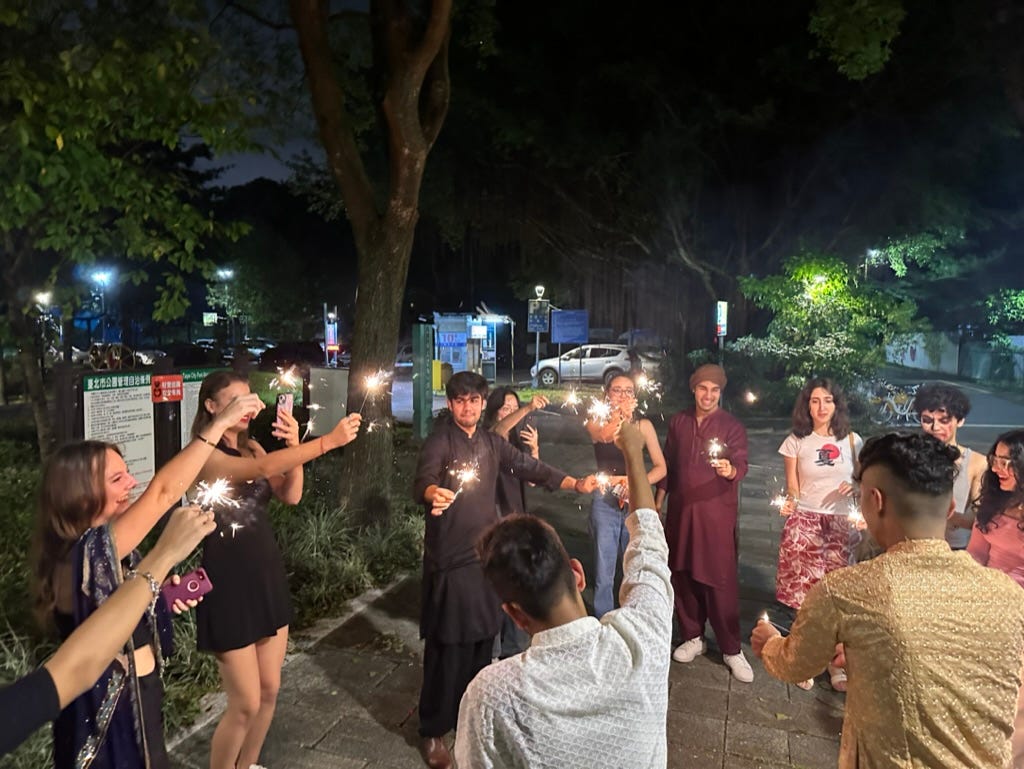OH MY GOD, it’s already October at Minerva University (2024)!
Sharing the stories of Taiwan’s indigenous communities, a practical tip for college living, Ubuntu ethics and the South African TRC, and two hundred lifelong friends.
PS. A huge milestone for my personal podcast, ‘Uni Unveiled’ having reached 25 episodes and over 2,100 minutes of value-driven conversations about the authentic university experience. Episode #25 is a special one with Aarushi Vij from IIT (Indian Institute of Technology) with an acceptance rate of 0.5% (even lower than Minerva, that’s crazy!). Check out this special episode and other value-driven conversations on this channel:
https://www.youtube.com/@serenestrokes-inspiringchange
Now, where was I?
Storytelling as a tool to bring to light the stories of Taiwan’s Indigenous people with our civic partner, ‘SYAX studio’
‘SYAX studio’ is a company founded by Dumas Temu, a member of the Atayal tribe in Taiwan, with an eagerness to share the victories and challenges of Taiwan’s 589,000 indigenous people through the art of photography and documentary film. In a team of four, our goal is to help SYAX bridge this intense divide between the urban youth who have grown up in big cities like Taipei and lack a strong connection to their tribes and indigenous culture. I’m most excited for a 3-4 day trip we hope to take later this month to the South of Taiwan, where we will participate and assist in recording, shooting, and filming the tales of the indigenous people.
A few days ago, I was honoured to attend a director talk and AMA with ‘Laha Mebow’, director of the award-winning film ‘Gaga’, which portrays the life, struggles and journey of a multi-generation indigenous family in northeastern Taiwan. Also from the Atayal tribe, it was heartwarming to see the personal, emotional connection Laha had with her work to really educate all Taiwanese about this integral component of their nation, history and culture, which is slowly but surely being lost in the winds of time.
Overall, the project has taught me that storytelling can be a bridge which allows people to empathize and relate to the experiences of another being with whom perhaps they share very limited common ground. A tool to share a ‘slice of life’ that feels a bit distant when reading a scientific article or research paper about the lifestyle of an Atayal tribe member. I know so little about my roots that a visit to my original village felt foreign and alien to me, but maybe a powerful film could someday bring even me a step closer!
A practical tip for college living
The quality of your questions will determine the quality of your answers
The people around you at university are banks of lived experience, knowledge, wisdom, insights, expertise and wild ideas – your classmates, professors, student life team, upperclassmen, juniors, and roommates. But nobody is going to sit down with you one day and narrate to you their entire life journey. You will have to keep digging and searching, slowly putting the puzzle pieces together; a puzzle with unlimited pieces, honestly.
Small talk and ‘quantity time’ is necessary and crucial to establishing an initial relationship. But beyond that, you will have to make the effort to dig deeper because trust me, all of your friends have experienced a lot and formed a pretty solid worldview of their last 18 years of life.
Remember…
· Factual questions probably won’t give you spiritual answers
· Leading questions probably won’t give you mind-blowing answers
· Close-minded questions probably won’t give you open-minded answers
Think about the type, depth, quality of answers you would like to receive from your network at university and then reverse-engineer your questions accordingly.
3 quick tips:
· No assumptions. Be basic, broad, and open-ended. Start macro, then move to micro. Don’t begin by asking your American friend why they think ‘Silicon valley is dying’, first ask them to define what ‘silicon valley’ means to them and prepare to be pleasantly surprised.
· Wherever relevant, be vulnerable and authentic about the motivation behind asking your question. When asking my friend about why they switched from being Christian to atheist, first explain to them why their answer is meaningful and important to you (maybe because you have also begun doubting your own faith over the last few weeks).
· ‘Why’ to ‘how come’ – the simplest, most powerful rephrase. To some people and cultures, ‘why’ questions can seem judgmental, direct, intrusive whereas ‘how come’ conveys the same meaning but more politely, empathetically, and open-mindedly. Switch from asking your roommate ‘Why do you only shower once a week?’ to ‘How come you only shower once a week?’
Academics at Minerva – Philosophy, ethics, and the law
Topic highlight
Ubuntu ethics and South Africa’s TRC
The roots of Ubuntu can be traced back to the indigenous peoples of South Africa. A huge premise of the philosophy is the concept of ‘I am because we are’, highlighting how my humanity has value because of the humanity of the people around me. In contrast to individualism, the focus here is inter-connectedness, harmony, and peace within a community, where the individual’s well-being directly affects and is affected by the wellbeing of the community. The concept of ‘Ujamaa’ is crucial, describing a relational understanding of personhood. The interconnected web extends beyond close family and friends, rather it is seen as the entire community’s responsibility to care for people who are suffering.
Books have been written deconstructing this philosophy, but I would like to connect Ubuntu ethics to an interesting case study of the South African Truth and Reconciliation Commission (TRC). After more than 46 years of apartheid, South Africa was a scarred country with rising communal hatred, racial disparity, and collective wounds on the nation’s body. The Mandela government took a radical approach to rebuilding the nation in 1994 – they established a TRC, guided primarily by Ubuntu ethics rather than punishment or punitive justice. Here are some key characteristics:
· Perpetrators of crime, violence, even murder were encouraged to come forward, confess their crimes, and seek forgiveness from the victim/victim’s family. Many who came forward in full honesty were not punished, because they had ‘come back to their humanity’.
· Victims and their families were encouraged to openly verbalize their suffering, many of them breaking down uncontrollably as they recollected these traumatic incidents. Individual suffering is communal suffering, so when an individual verbalized their pain, the entire community bore the brunt of this pain, and now the healing process would be supported by everyone, rather than weigh down on the individual/their family only.
· Ubuntu ethics views dialogue, forgiveness, and amnesty as more noble and long-term useful for the community, rather than just direct punishment because punishment heals nobody. When a woman forgave the man who murdered her son, she later recounted that her forgiveness was the first step in restoring humanity to the perpetrator and allowing herself to initiate her own healing process.
There are numerous philosophers who have argued both for and against this philosophy – I encourage you to think about what your criticisms or moral objections to Ubuntu ethics would be, especially in the context of the TRC.
South Africa is just one among many global cases where a community has been hurt/ suffered/been torn apart – think of any nation which was colonized by another and you will have a live example. However, the West has such a different approach to justice and individual forgiveness, as seen in the Nuremberg trials for example, which were primarily focused on bringing perpetrators to justice through punishment with limited focus on individual forgiveness and healing. Ubuntu aims primarily to be an ethical framework, not a legal one and so I wonder how these beautiful concepts of communal forgiveness, healing, and humanity can be more formalized and better applied to any post-conflict society, if at all, because setting a broken house on fire isn’t the same as putting the bricks back together.
Student Spotlight
Amina Rakhimbergenova (Kazakhstan)
Let’s begin with what I will call the inception of your tech entrepreneurship journey. Say more about being the founder of FunCode.
Even when I’m not actively engaging in entrepreneurship, I view myself as an entrepreneur. That’s my mindset and attitude towards life and experiences – building things, solving problems, and letting my imagination run wild!
As a high schooler, I adored participating in hackathons – there was something addictive about the sprint of rapidly generating and building out an idea within 24/48/72 hours and then presenting it to judges with conviction, clarity, and power.
After one particular hackathon, I became so passionate about the idea we worked on that I wanted to bring it to life. During this crypto hackathon, I was in a team with 2 acquaintances where we fleshed out the idea for a ‘play to earn’ cryptocurrency game where users could play fun games with exciting characters, and earn small amounts of cryptocurrency for making it to specific levels. I loved the concept but wanted to apply it to computer science education and programming.
Myself and a teammate from the hackathon developed this idea of ‘learn to earn’ – learn programming to earn our crypto tokens. JAS Ventures in Kazhakstan expressed interest in our idea and invited us to their office along with the other finalists of that hackathon. The venture capitalists were impressed by my initial pitch, and encouraged me to give this idea deeper consideration and effort. I dove right in.
I began assembling a team, really taking advantage of my solid network of like-minded entrepreneurs/builders I had found through previous projects, hackathons, high school friends, etc. Within two weeks, with my co-founder Saya, we had a basic website built where you use Python to control your game character – with this proof of concept, the fund invested an initial USD 2,000 into the idea – a special moment for me because it really struck me then that this was no longer a cute hackathon project, but a real-world business now with real cash involved!
Using the initial investment, we hired a qualified software developer and designer, outsourcing marketing to another company. We entered a business acceleration program called ‘QuickStart’ which lies on the solid base of Nazarbayev University in Astana. With the right guidance from mentors in this program, we were able to raise a further USD 4,000 for our venture.
Our initial customer conversations led to the realization that the local market was not yet ready for cryptocurrency, so we pivoted to focus on the gamification of IT education and coding for children and teenagers. There was a clear market gap given the over-theoretical and quite basic level of computer science education for public school students nation-wide. Almost every teacher we spoke to in a Kazakh public school said there is a sheer lack of value in computer science classes for students, and this was evident when we sat in the back of classrooms and saw the level of (dis)engagement from the kids.
We targeted different customer segments with varying degrees of success, including private schools, public schools, and individual moms and dads. I made hundreds of cold calls – wrote different sales scripts and measured the conversion rate for each script. The biggest learning here was really taking some time to understand and find the exact pain point of our customer and then positioning the product in a way that directly solved their problem.
Soon after, myself and my co-founder left for university, which made it difficult to continue building, hence for now the project is on temporary halt. But not before we all deeply internalized the positive potential of our idea to truly revolutionize IT education across the country, and become an integral software used by every public school and every student in Kazhakstan to equip our youth with this 21st-century life skill.
The entire experience taught me that you don’t even need to be an ‘adult’ to begin building a meaningful company and earning some profit. At age 17, I decided to take a gap year primarily to focus on scaling up this company. Lastly, as an entrepreneur, a crucial mindset to develop is being clear on your ‘why’ (the north star), but being flexible with your ‘how’.
I am sure that as an entrepreneur you realize the value of mentorship and learning from a role model. Share more about your experience working at Trilobio, a robotics Start-up based in San Francisco, with the opportunity to really shadow and learn from some seasoned entrepreneurs.
Once I received my acceptance into Minerva, I spent a lot of my summer break just visualizing what ‘Silicon valley’ would be like, on the ground. Throughout my first year, networking was equally important to my academics, hence I was all over the Bay Area, attending events and conferences. One of my favourite events was ‘Women in tech’, bringing together female founders across the Bay Area who specifically were not just profit-driven, but more so mission-driven.
At one such event, I met Roya, the co-founder of Trilobio. She articulated her vision for automating synthetic biology, by building robots that automate mundane lab work so that scientists could spend their time testing and building hypotheses instead of just pipetting for hours, which can definitely be automated.
My conversation with Roya flowed smoothly and at the end, she invited me and a few other Minervans to visit her lab! A few days later, we took a tour of her lab which honestly reminded me so much of a ‘start-up garage’ – bustling with the fast-paced energy of new ideas and prototypes. We interacted enthusiastically with her amazing team for a few hours, and amid all the excitement and chaos, I left my purse behind. I informed Roya and the very next day, was back in the office frantically searching for that lost purse. Alas, the purse was lost but I knew I would not lose a once-in-a-lifetime opportunity as well! I eagerly told Roya that I would love to volunteer at her lab, for free, over the next two months, before I flew back home for the summer. Luckily for me, they were looking to hire people to assemble the robots) and she expressed her openness to my proposal.
Soon after, I was at the lab, assembling things, learning how to properly use a screwdriver, milling machine, drilling aluminum, and figuring out how to use a 3D printer. Much gratitude to the co-founder, Max, who took the time to patiently teach me these invaluable skills, which practically exposed to the fundamentals of electrical engineering!
Fast forward to April-end, and I was seriously considering a full-time summer internship with Trilobio because I was so passionate about the mission and day-to-day work! They conducted a soft skills interview for me, really grilling me on why I wanted this position, what I expected from the experience, what value I could add, etc., and not long after, I was in!
I spent the summer on the project of increasing precision by adding vision to these ‘otherwise blind’ robots. Previously, the robots were only executing the commands which they received over CAN signals (8 Mbps) with specific coordinates. Meanwhile, I was adding cameras to the robot, transmitting data with USB 2.0 protocols, which are 60 times faster (480 Mbps)! Starting with re-designing the internal wiring, I designed and assembled my own PCBs (Printed Circuit Board), worked with high-frequency oscilloscopes and analyzed + debugged firmware.
Towards the end of my internship, I was extremely driven to have tangible success for my project – hence sometimes I would stay in the office till 8 or 9 PM! I had inspiring conversations over lunch and coffee with the entire team, where we discussed every topic under the sun, personal and professional.
San Francisco start-up culture is magical and so hard to replicate, anywhere else in the world. It’s comforting to know that however crazy the idea you are building is, there are so many people in this fascinating city who are building something even crazier.
A lot of my mental barriers were broken over these 3 months: seeing somebody build an ethical start-up, realizing that exponential growth and ethics are not incompatible in the tech industry, and seeing myself work on projects which generally require the training and education of at least an engineering college graduate. Few things in this world are more rewarding than seeing your own exponential growth over a few months, day after day, in front of your very own eyes!
Let’s take a moment to step outside the fascinating world of tech and highlight how you also view entrepreneurship as a tool for social impact and communal change. The most recent life update is that Amina is leading the charge for a feminism-focused clothing brand. I’m super intrigued, say more…
Kazakhstan is a beautiful country that will always hold a sweet spot in my heart, but I must say, our society is witness to misogyny, conservative gender attitudes, and patriarchy. As a girl in STEM and entrepreneurship, I have experienced this firsthand. At times, when negotiating a business deal for my start-up, I had a sense that the man on the other side of the table would take me more seriously if I were a man too.
I was often the only girl in my robotics or math Olympiad class, despite knowing that several of my female classmates were interested but felt discouraged from joining. Through increasing exposure to global media, I slowly learnt more about this ‘feminism’ concept and its importance. The cause resonated deeply.
A few months ago, a friend reached out to me with the idea of a clothing brand they were hoping to create, centered on this theme of feminism. They had begun working on step 1, which was to find and gather a mission-driven, talented team of creative individuals who truly believed in the idea’s potential. I was on-board and joined the core team very soon!
Our message to the entire team was clear – we are here not only to make profit, but also to spread educational information about feminism and educate/cultivate strong independent women in our society –a profit-driven business with a social impact edge.
Our t-shirts have powerful slogans on the back (in Kazakh, Russian and English), like ‘Beauty standards are suppressing women’, ‘Our anxiety is a normalization of violence’, ‘The woman’s place is where she wants to be’, etc.
Finding a manufacturer was a long and frustrating journey. Being an ethical brand, we cannot partner with any manufacturer who refuses to give us 100% transparency about their production process and employee wages, because we are against cheap labour and child labour. Finally, we’ve found one studio in Astana, and another in Almaty that meet our strict standards, and production is already underway!
Very recently, we had an inspiring photoshoot with female models, feminist activists, female singers, writers, girls in STEM, etc. who wore our t-shirts and all said ‘Cheese!’.
Long term, we want to become a huge brand across post-Soviet countries, potentially expanding into accessories, bottoms, hoodies, and other garments as well.
Despite all the late-night calls and overwhelming workload, this venture is exactly the first thing I think about and want to work on, when I wake up in the morning. I genuinely think I’ve found my Ikigai here.
Shout-out to my co-founder and COO Adele, CMO Saya, and the rest of our beautiful team – it is an honour to collaborate with you on this mesmerizing journey!
Book of the month
Movie of the month
Poem of the month
Everything comes from nothing
Like the universe itself
Nothing
And then
Boom!
Everything
Like the tallest tree
Which was once
The smallest seed
Buried deep in the ground
Like the vast ocean
Which must have begun
With one teeny tiny
Miniscule
Droplet of water
Like the mighty eagle,
Ferocious crocodile,
Deadly Komodo dragon
Which once were
Fragile white baby eggs
susceptible to
the lightest breeze
and the mildest river current
Like the most revolutionary ideas
born from inside a bathtub
just lying there dormat
until they grow and grow
exploding beyond the confines of a mind
Like you and me
before we were CEO’s , billionaires, Olympians
helpless little creatures
in our mother’s womb
entering this world
insignificant as a speck of dust
From nothing comes everything
And to nothing
We must one day
Return
Wow! That was long. Please subscribe to my newsletter if you would like to stay updated with my monthly adventures as I travel to six global cities (San Francisco, Taipei, Seoul, Buenos Aires, Hyderabad, and Berlin) over the next three years with Minerva University. Until then, Au revoir!
PS. Celebrating Diwali in Taipei with my Indian and Pakistani friends!
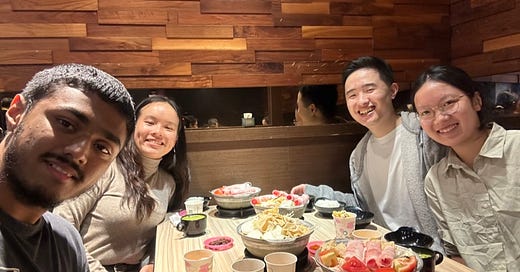



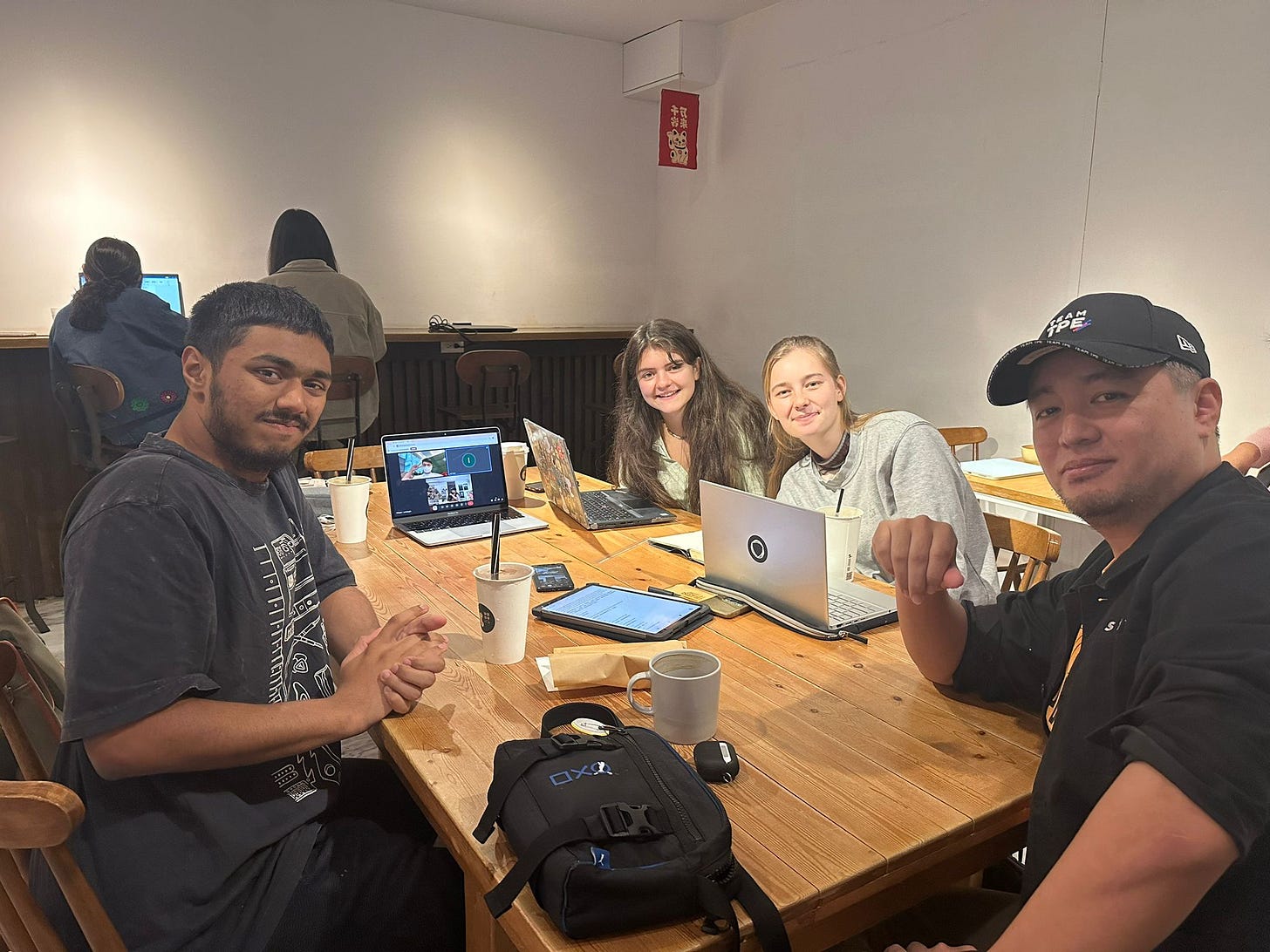







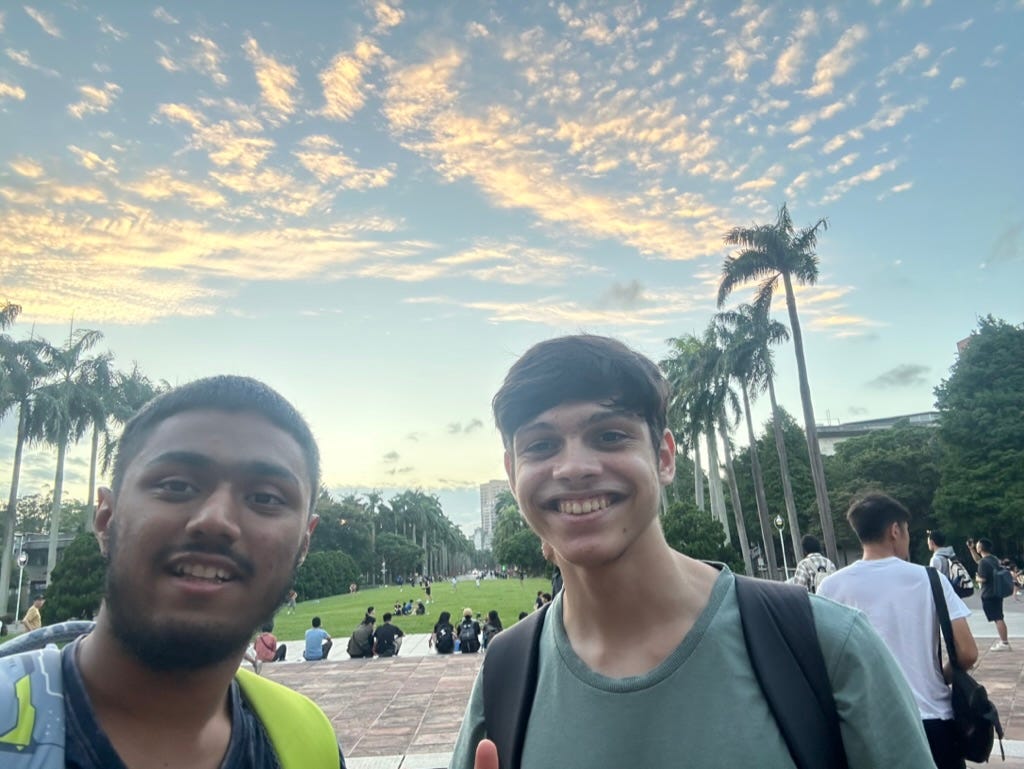
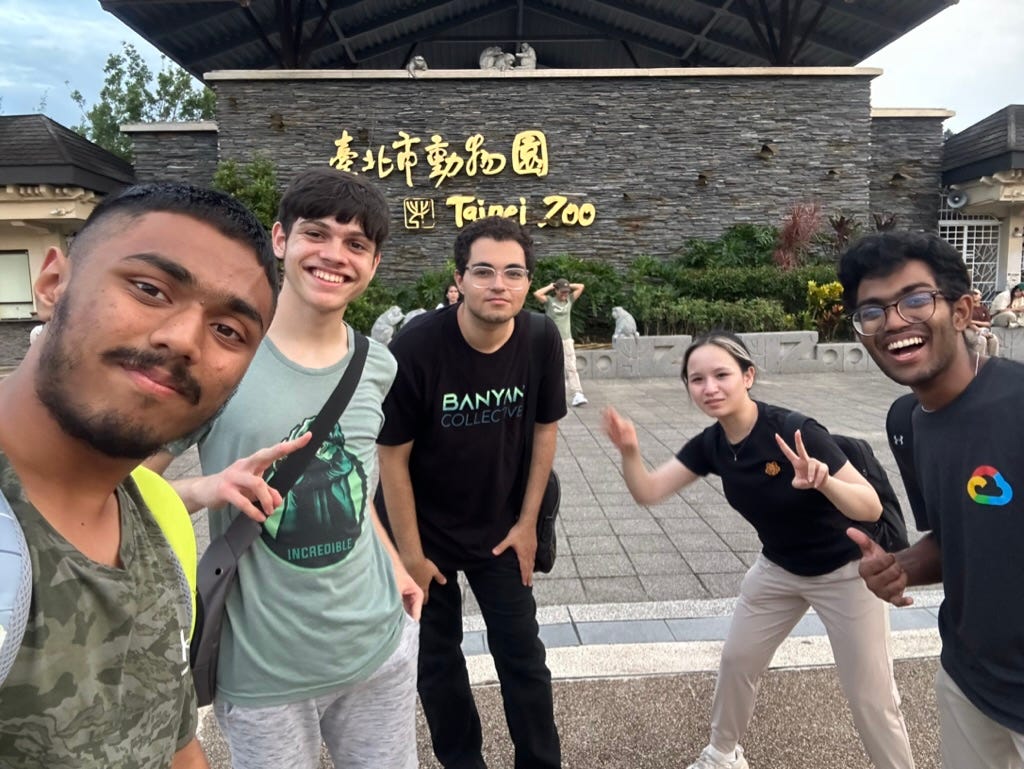
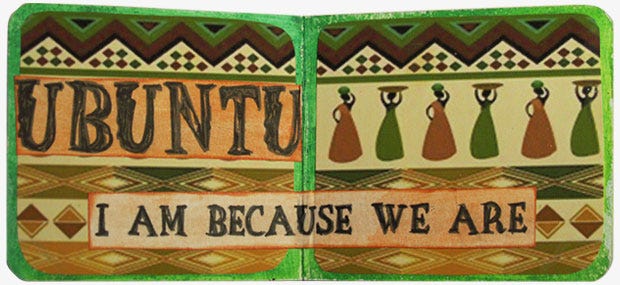
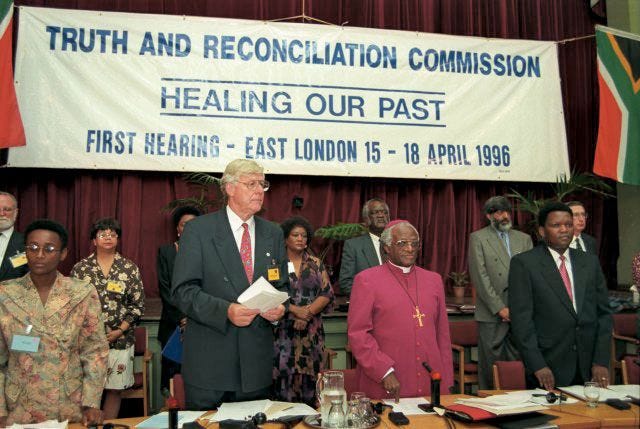
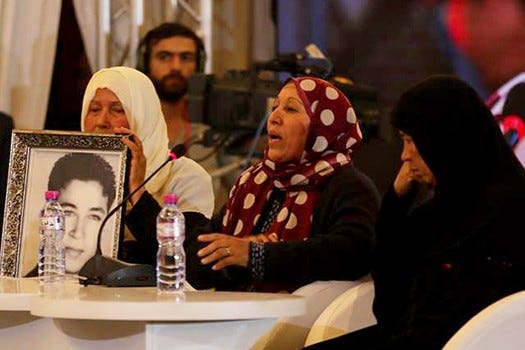
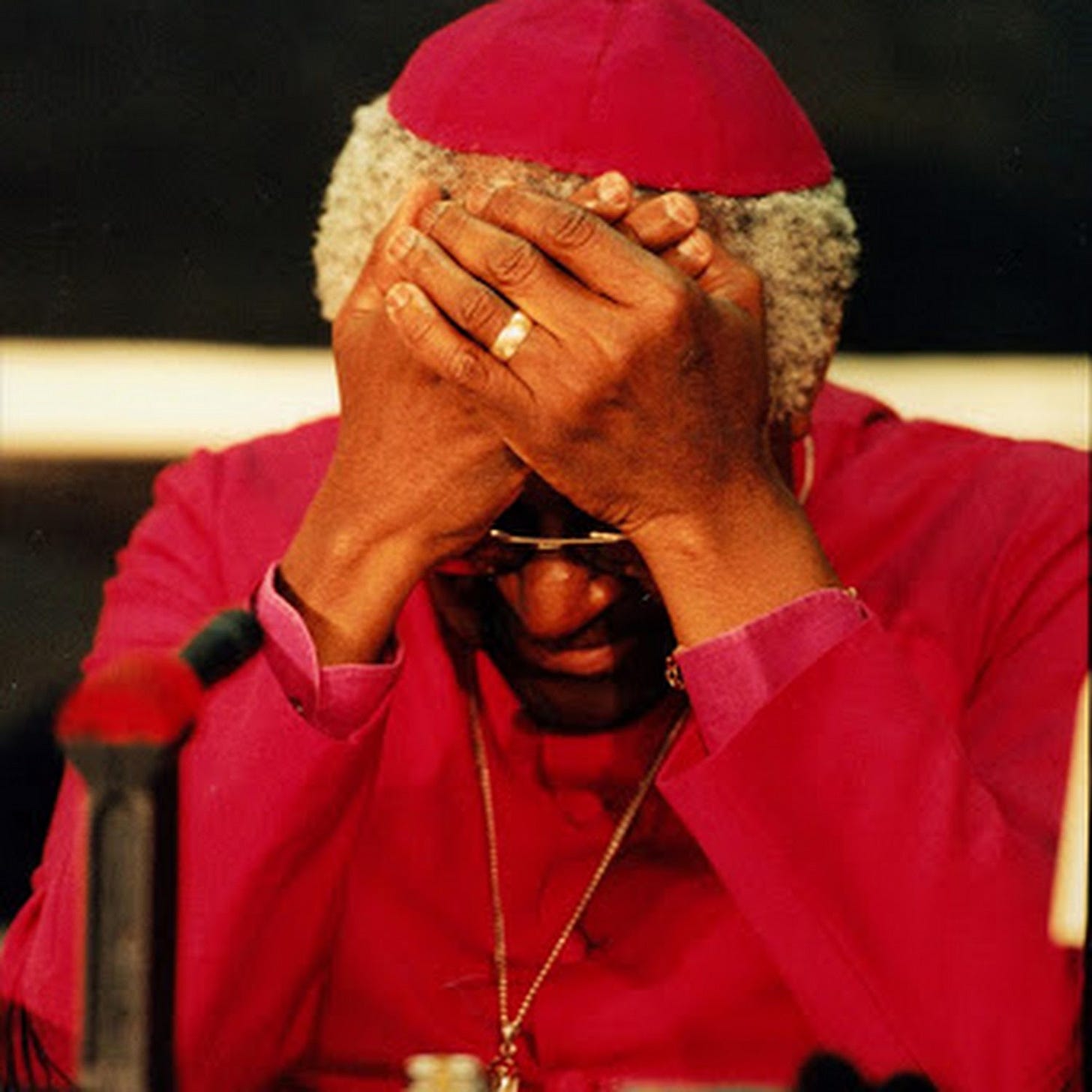

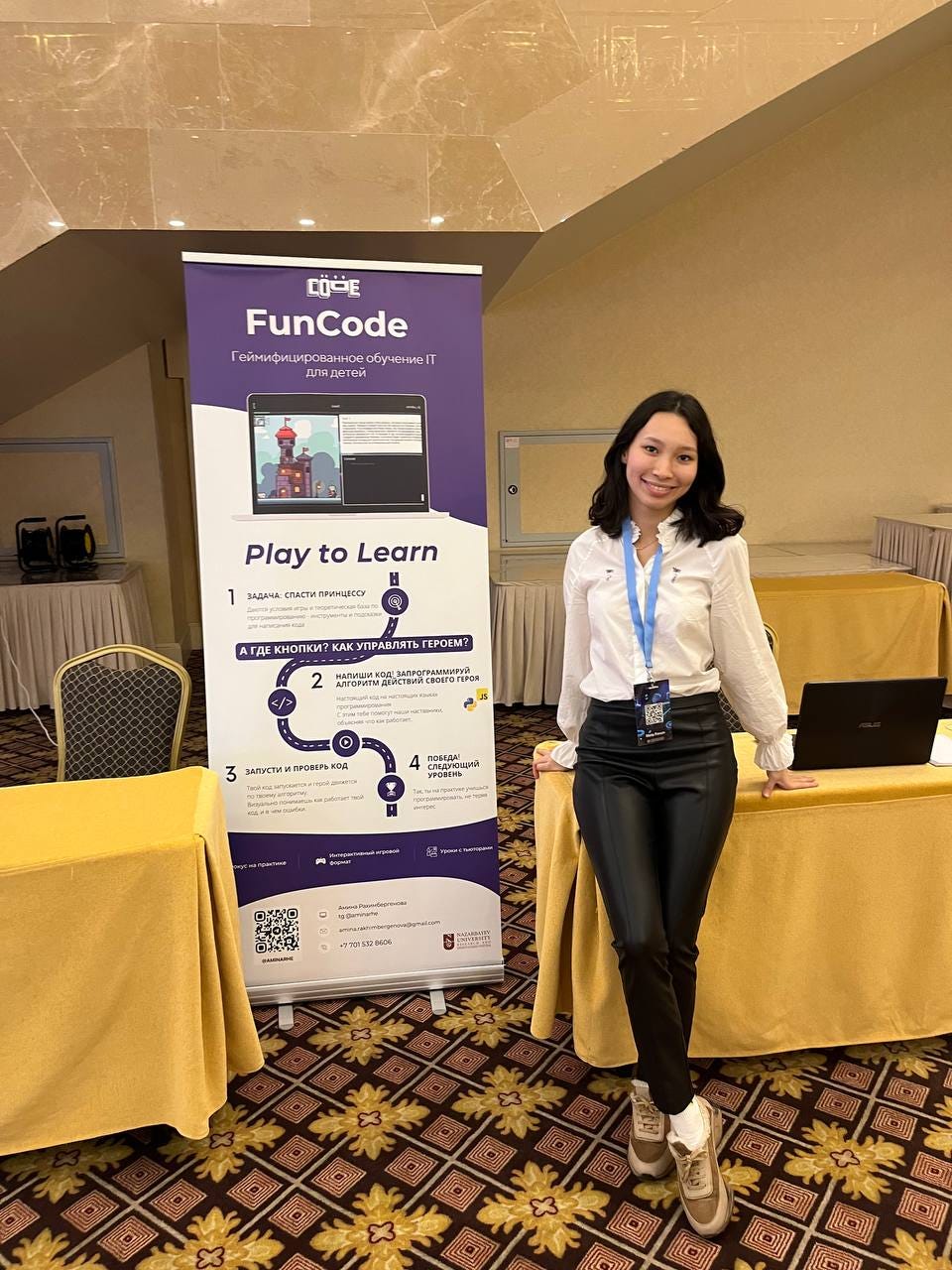
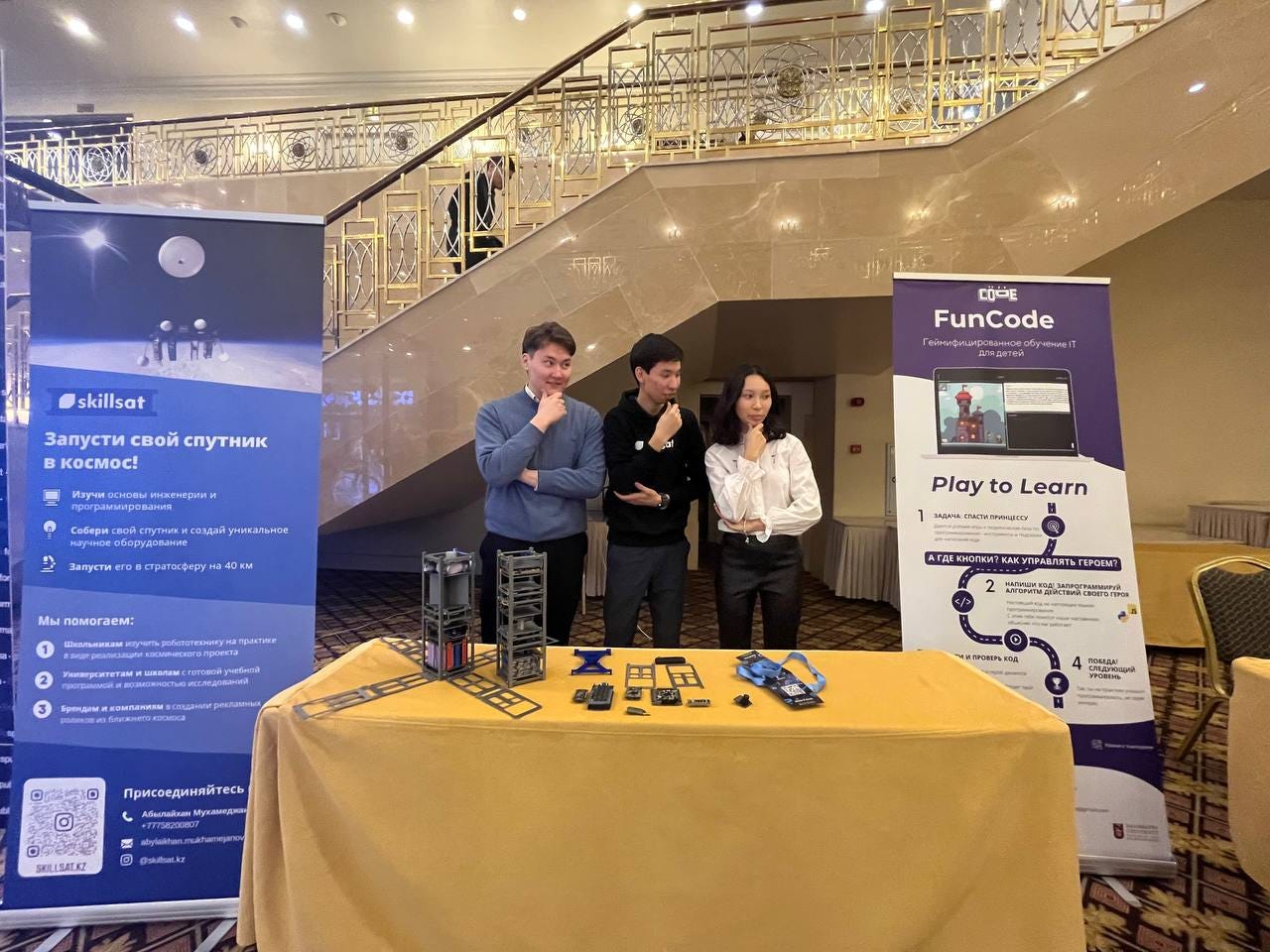
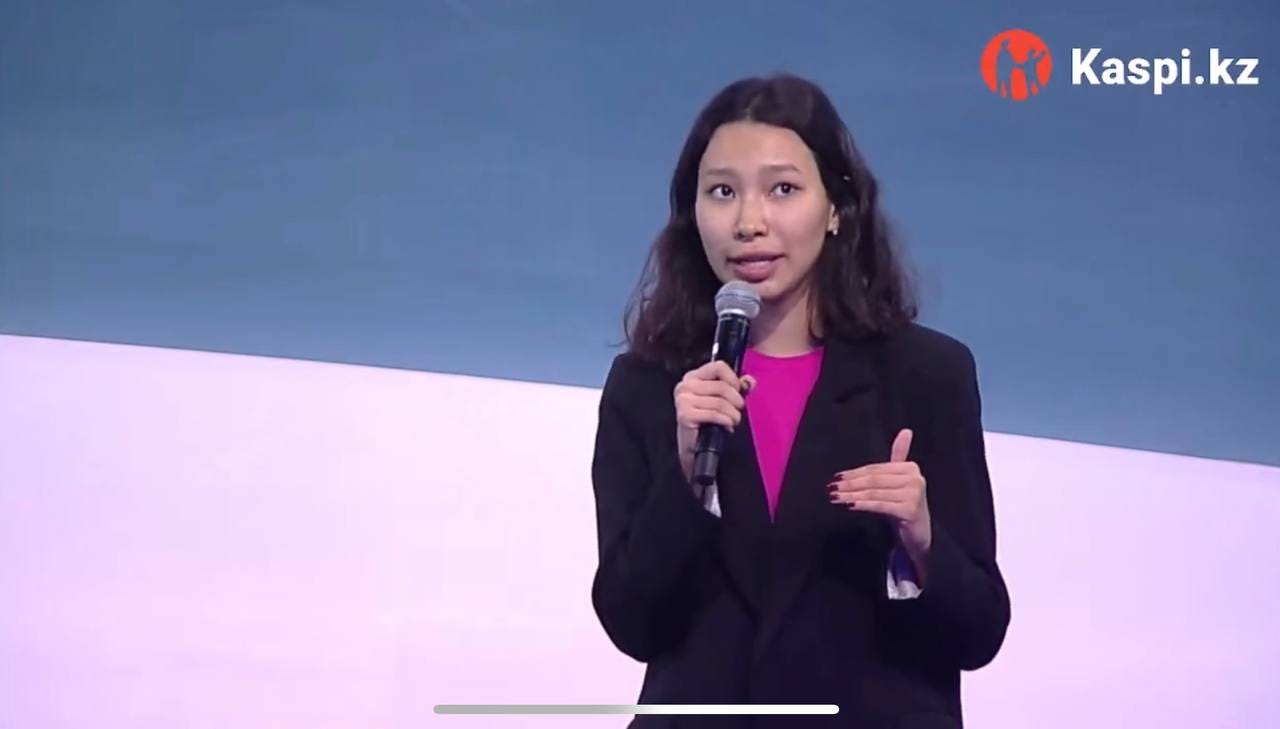
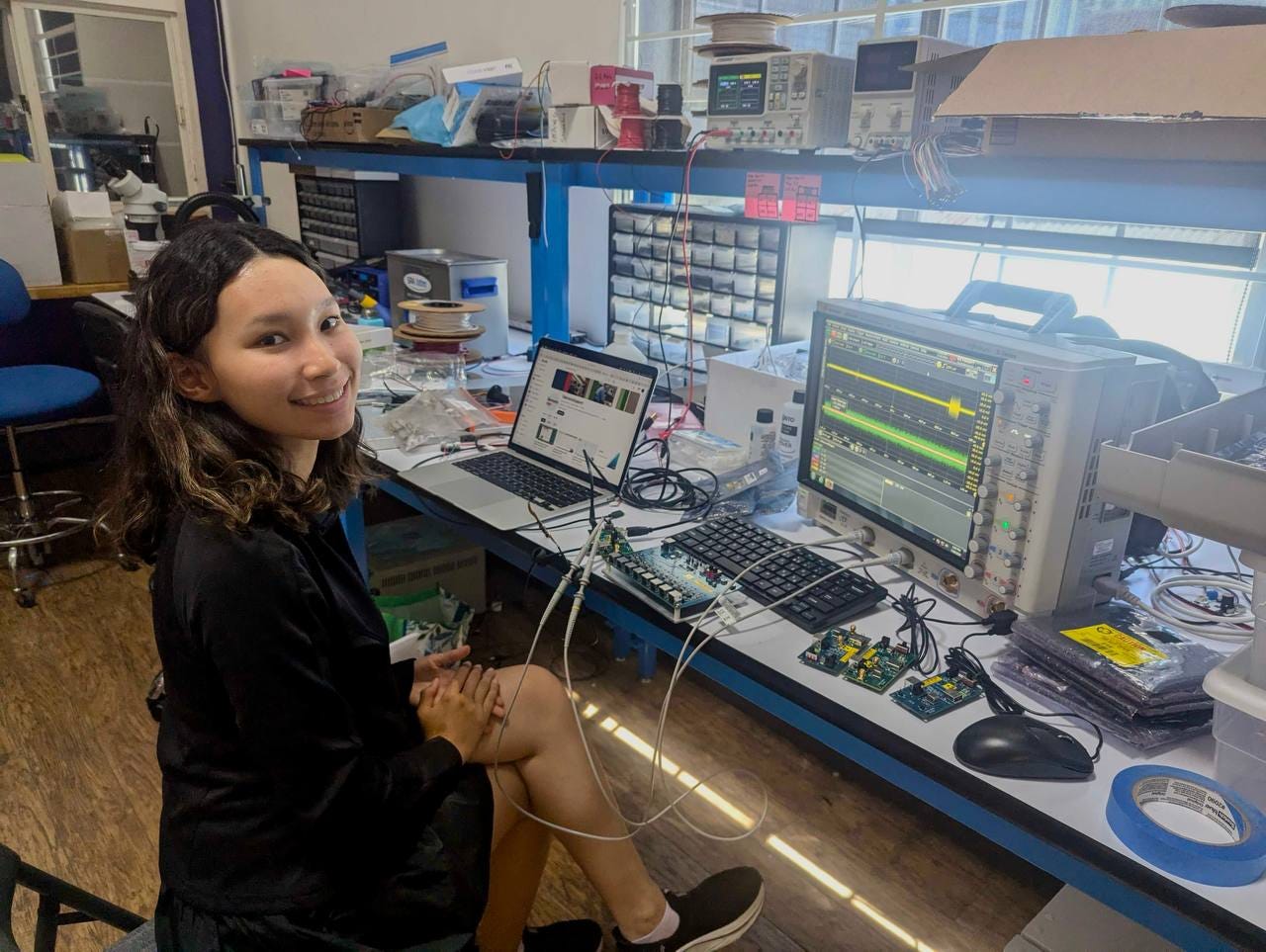
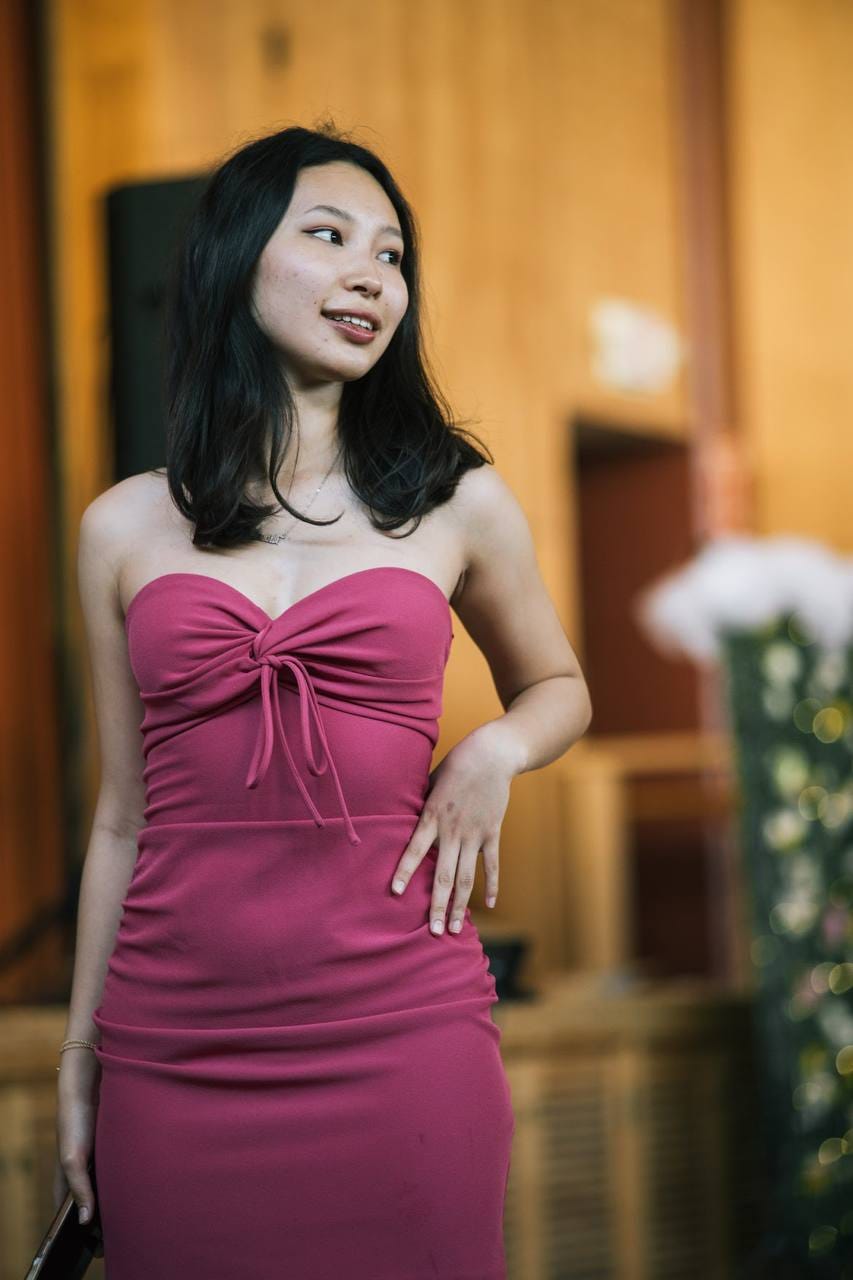
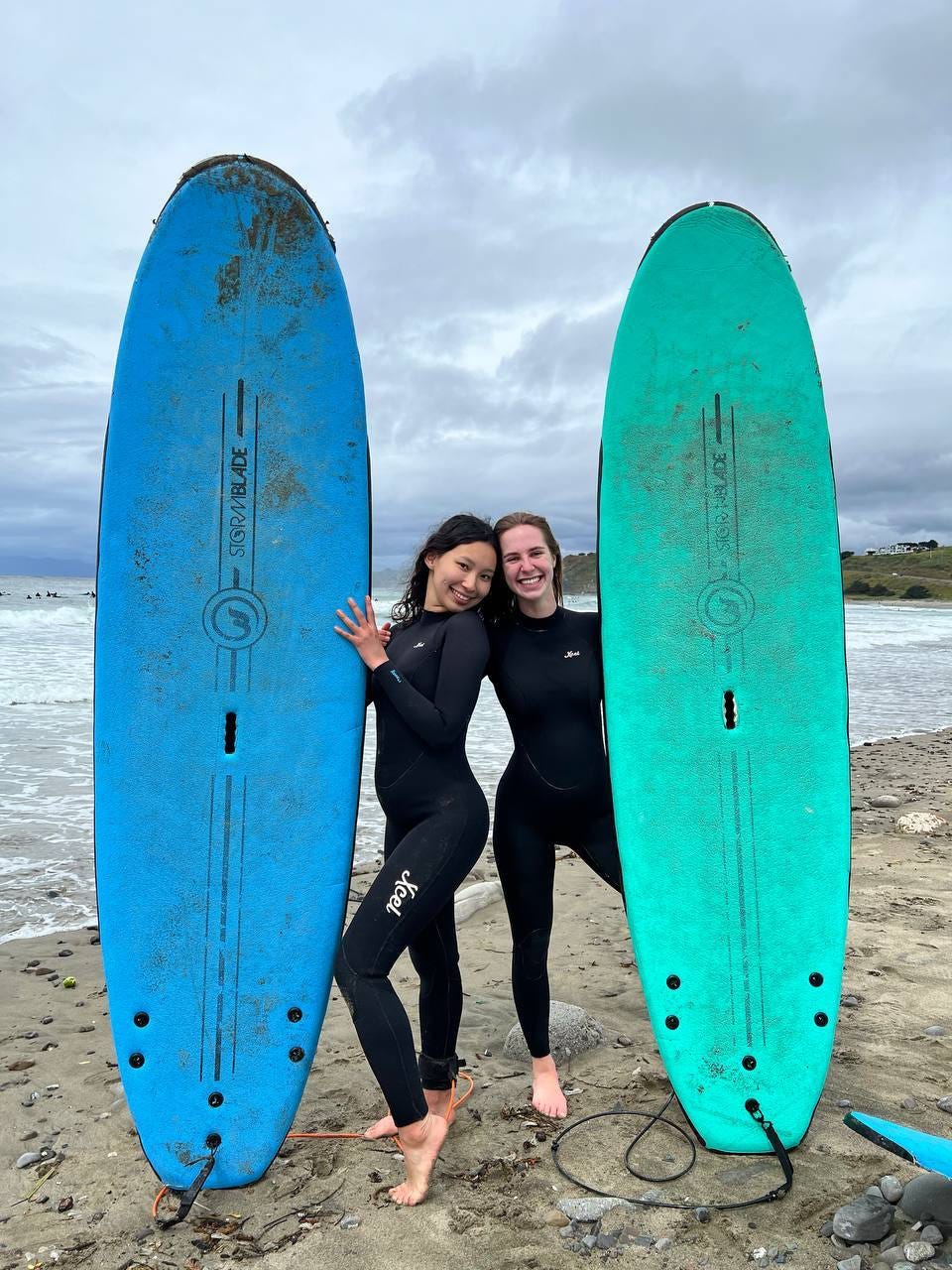
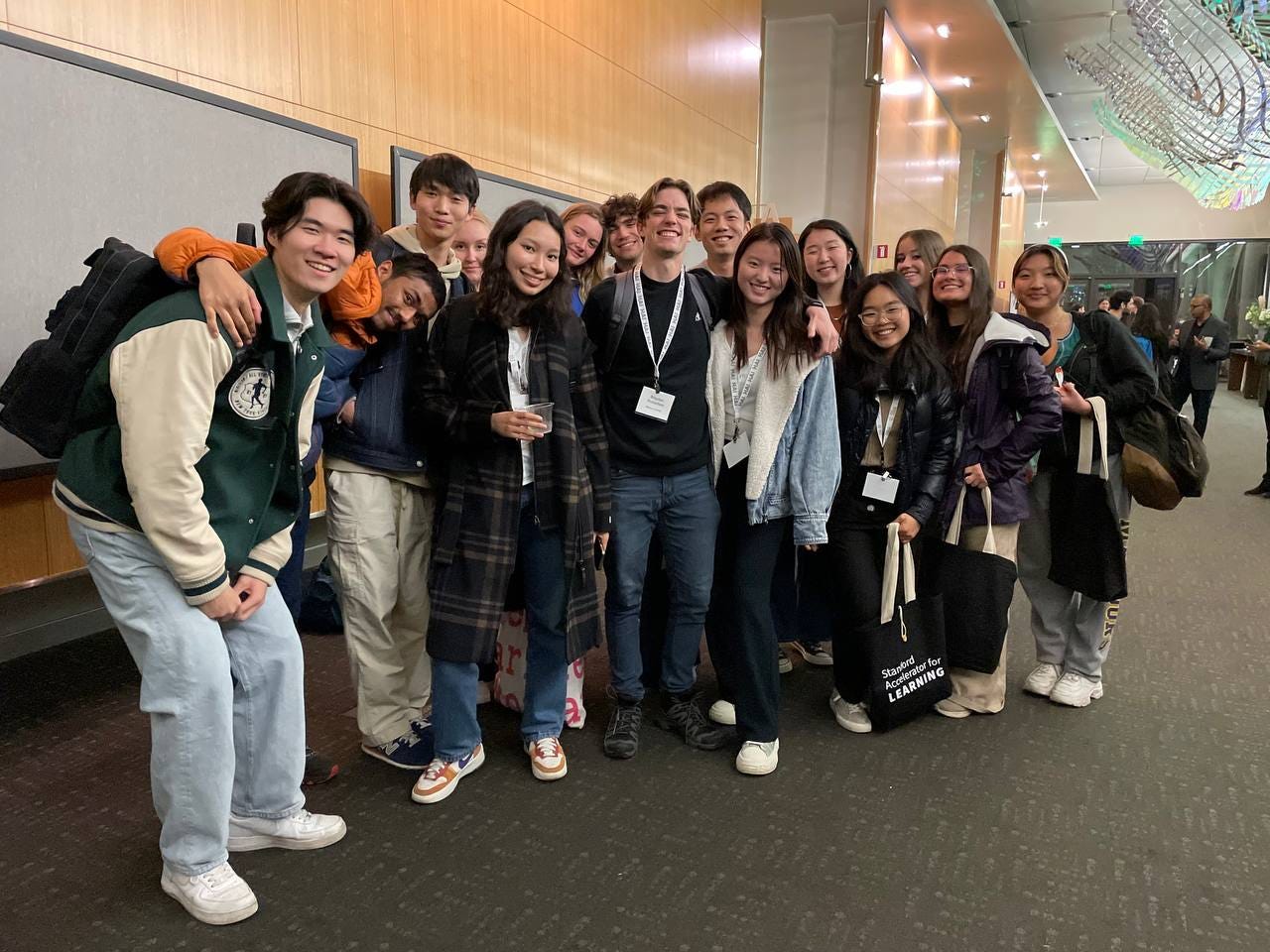
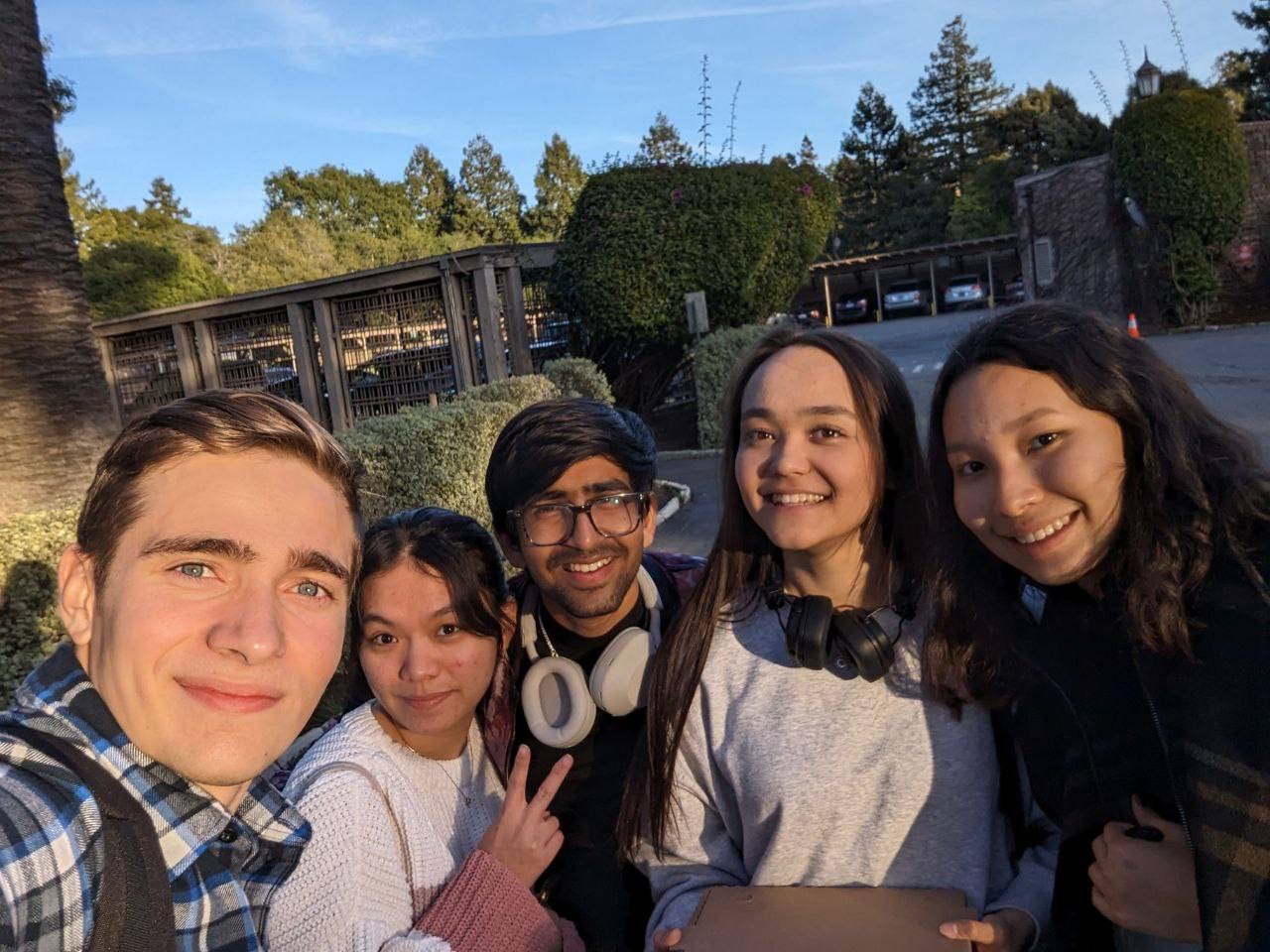

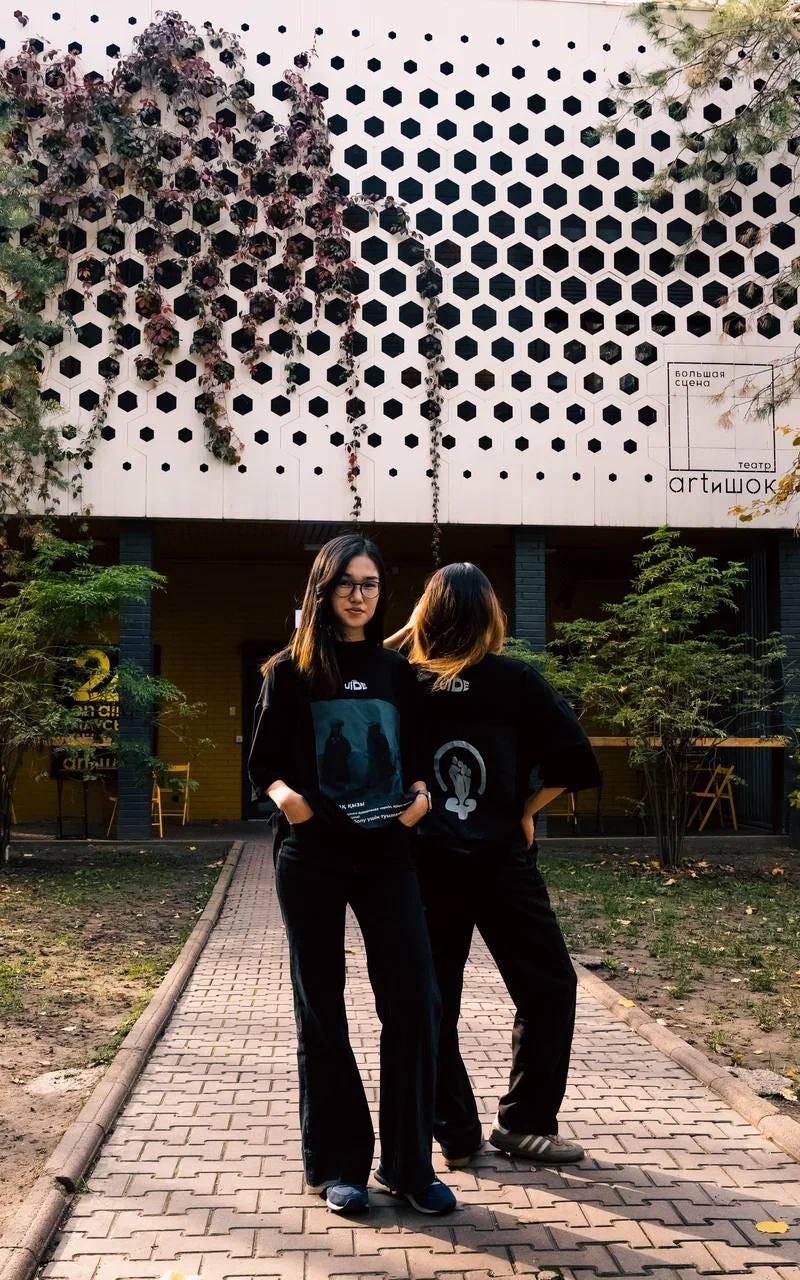


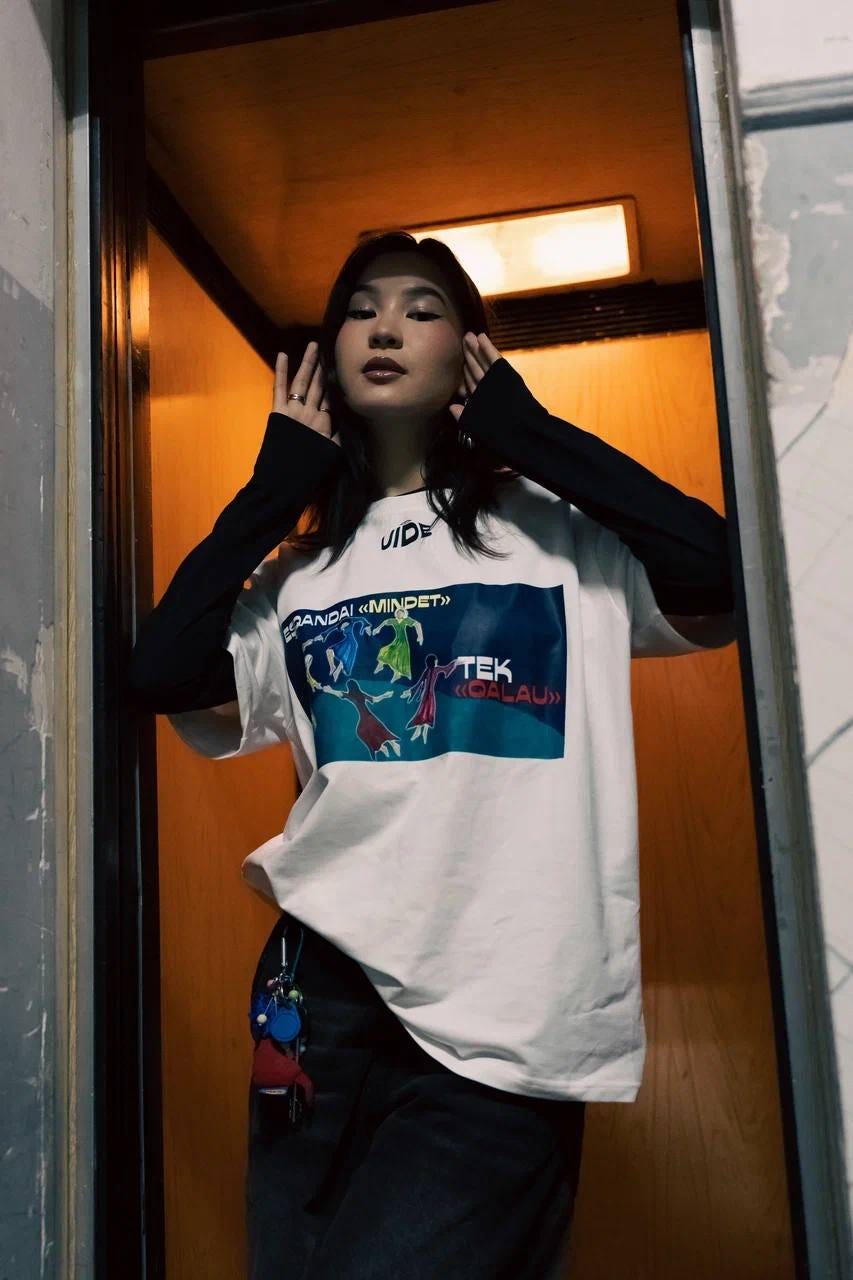
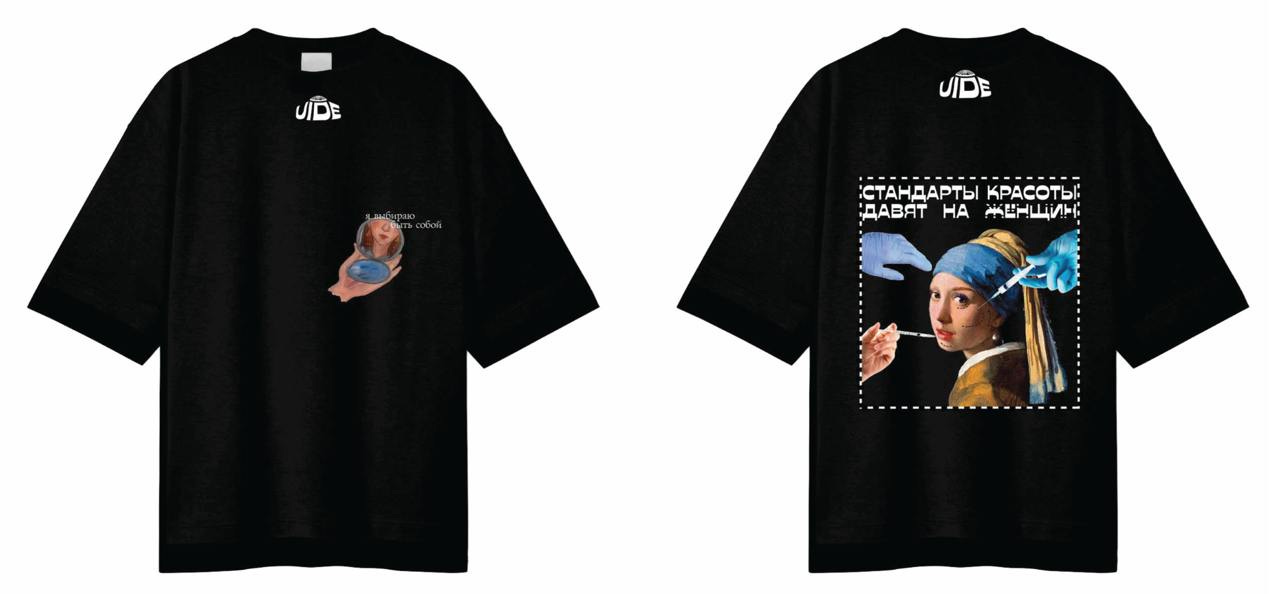
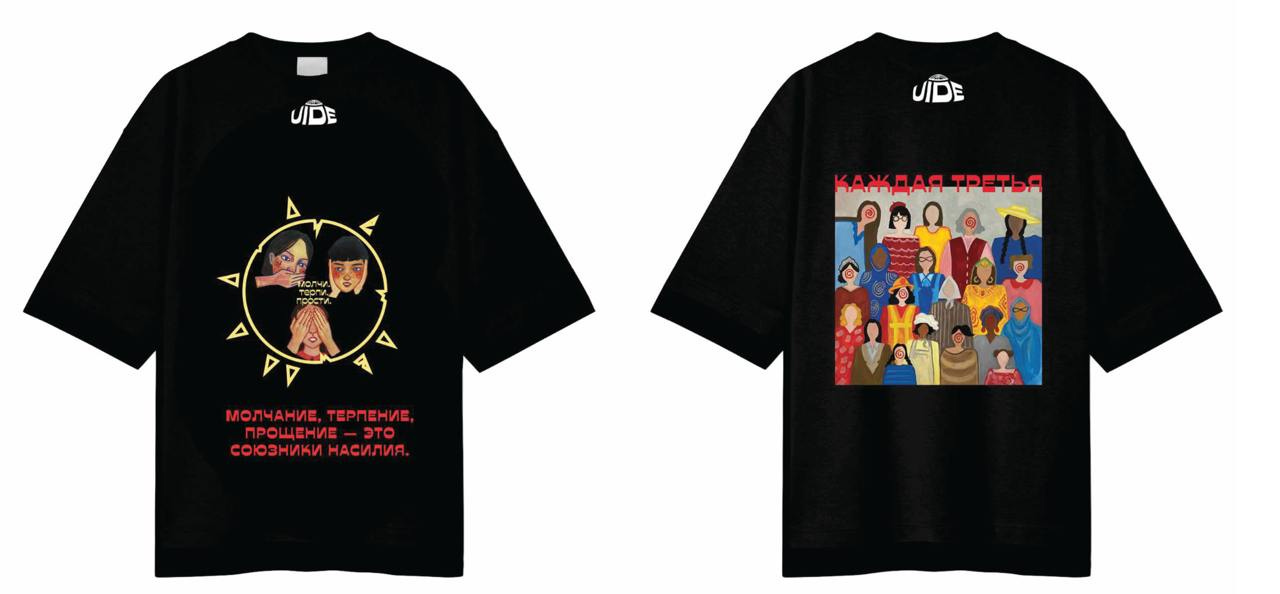

![Waltz with Bashir [Region 2] Waltz with Bashir [Region 2]](https://substackcdn.com/image/fetch/$s_!y829!,w_1456,c_limit,f_auto,q_auto:good,fl_progressive:steep/https%3A%2F%2Fsubstack-post-media.s3.amazonaws.com%2Fpublic%2Fimages%2F66cd191b-ec3f-4be7-b7f3-2f7f52a88f23_500x500.jpeg)
